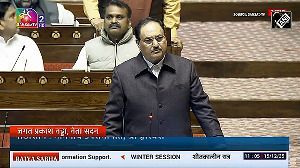You're against war. You are sickened by so many things about war. The kill counts that reduce living human beings to dead numbers. The accounts of slaughtered -- maybe mistakenly, but still slaughtered -- civilians, including children in dresses and T-shirts. The adulation for machinery whose sole reason to exist is killing and destruction. The hypocrisy on every side: Saddam's appeal to his people to resist the enemy must be stacked up against his record of having used Iraqi weapons against those very people; Bush's talk of fighting for freedom must be seen in the light of long years of US support for such disgraces to humanity as Chile's Augusto Pinochet's regime and apartheid South Africa. And there are the hatreds expressed, as when a Corporal Ryan Dupre told Mark Franchetti of the London Times:
'The Iraqis are sick people and we are the chemotherapy. I am starting to hate this country. Wait till I get hold of a friggin' Iraqi... I'll just kill him.'
You're against all these features of war. Yet the war has begun. I could be wrong, and rarely have I been so keen to be so: but as the war grinds on, an end looks farther and farther away. What do you, being anti-war, do?
I don't have an answer to that. But nevertheless, spend a few moments with me here. Let's brood together over some random facets to this war, facets the fighting itself throws into sharper focus.
One, there is indeed a man to be dealt with out there. Sometimes it is easy, being anti-war, to forget that basic truth. In this case, however much I deplore Bush's course and motives, I need to remember that Saddam is no innocent and helpless victim. In numberless ways, he has terrorised his country for years now. As Michael Walzer wrote in the New York Review of Books (March 13 2003):
'The tyranny and brutality of the Iraqi regime are widely known and cannot be covered up. Its use of chemical weapons in the recent past; the recklessness of its invasions of Iran and Kuwait ... the cruel repression of the uprisings that followed the Gulf War of 1991; the torture and murder of political opponents -- [these cannot be ignored].'
If this madman Saddam is not stopped, he will keep at this tango with injustice and death, one way or another, for many more years. Perhaps you think, like Walzer, that war is not the way to stop him. Or perhaps you think there is no other way. Whatever, the man must be stopped.
Two, however much you might deplore Saddam, it is very hard to see Bush as the white knight riding on the backs of his Marines to the rescue of freedom and democracy. Start with his own election to office, an accession that still carries the whiff of something not-quite-right. Move on to his support for another destroyer of democracy and country, another fount of terror, one Pervez Musharraf. Pause along the way to note his reluctance to hold Ariel Sharon accountable for Palestinian suffering; Vajpayee responsible for the Gujarat horrors of last year. Reflect when you're done that he has, via such entries on his resume, ground into the Iraqi desert nearly all the goodwill his country had after September 11. And don't forget the loud whispers about the other motives for his Iraq war: oil, business interests, Presidential elections next year.
The US does a lot of things right. But under Bush, and in Iraq, I can't see too many.
Three, the easy talk about how India 'must pursue its own interests' in response to this war, and that without paying attention to irrelevancies like 'morals and ethics.' Thrown in, always, are words like 'aggressive' and 'materialistic,' besides disgust at being 'a soft state,' yearning to be a 'hard' one instead.
Of course, India must pursue its own interests, but can we begin to do that if we throw away morals and ethics? Is being a corrupt nation really in our own interests? And what are these interests anyway? I believe our interests lie in immediately punishing those who goad Indians to kill other Indians, not giving them Z-security and calling them patriots; in embarking right now on a national mission to educate all Indians, not claiming there are 'stiff resource constraints' as our prime minister did in Lucknow in February 2000. Have we ever pursued these interests? Could it be that we are a 'soft state' because we have never pursued them? Because they are hard work? Because the soft option, the lazy option, is to ignore them?
Four, the meaning of religion itself. There have been other times that a conflict and all its repercussions were cast -- rightly or wrongly -- in such explicitly religious light. One such was 800 years ago, during the Crusades. Then, hordes of Europe's worst rabble, even of children, were persuaded to ride off to grisly war in the name of Christianity: by itself a thorough perversion of that faith. Today, maniacs like Osama and Saddam raise the tired spectre of Islam in danger, using that to justify their crimes. From Palestine through Iraq to Pakistan and Kashmir, gangs of rabble, even of children, feed on this spectre and ride off in the name of Islam to murder and terrorise: again a perversion of Islam itself. In turn, a whole Indian political dispensation feeds on this perversion and raises the equally tired spectre of Hinduism in danger. This sends more gangs of rabble off to murder and terrorise, now in the name of Hinduism. I cannot imagine a greater denigration of Hinduism.
So when religion is used like this, I have to wonder what religion means to begin with. Is it in the nature of religion itself to be twisted to murderous ends? Is it religious to be barbarous?
Five, the meaning of international cooperation and understanding. The UN was mankind's lofty response to the carnage of two enormous wars, a means to end tyranny and bring countries together. Nearly six decades later, it cannot effectively enforce peace, cannot rein in the Saddams, cannot prevent the world's most powerful not-quite-elected President going to war as he pleases. Besides, it would be hard to find a single country that is happy with its dealings with the UN.
I don't believe this means we should throw away the UN. But it must force an examination of the working of the organisation, a redefinition of its role and responsibilities so it can be effective. If this war can stimulate that introspection, that might be the silver lining I cannot otherwise see in Iraq.
Six, even after all the brooding, the reality remains: as you read this, men and women are dying in Iraq. The war rages on. Children are torn to pieces, soldiers are blown up in suicide attacks. Now I can't see Saddam walking quietly off into the sunset; equally, I can't see Bush shutting down his assault anytime soon. To me that leaves just one hope: that the war ends quickly -- like today -- in massive defeat for Saddam, with minimal lives lost, and Bush calls his troops home as soon as feasible after that.
Maybe it is a futile hope. But that's the thing about being anti-war in a time of Saddam and Gujarat, pseudo-religion and soft states, Bush and suicide attacks. You get used to futility
***
You can still send your comments to me directly at dilipd@rediff.co.in




